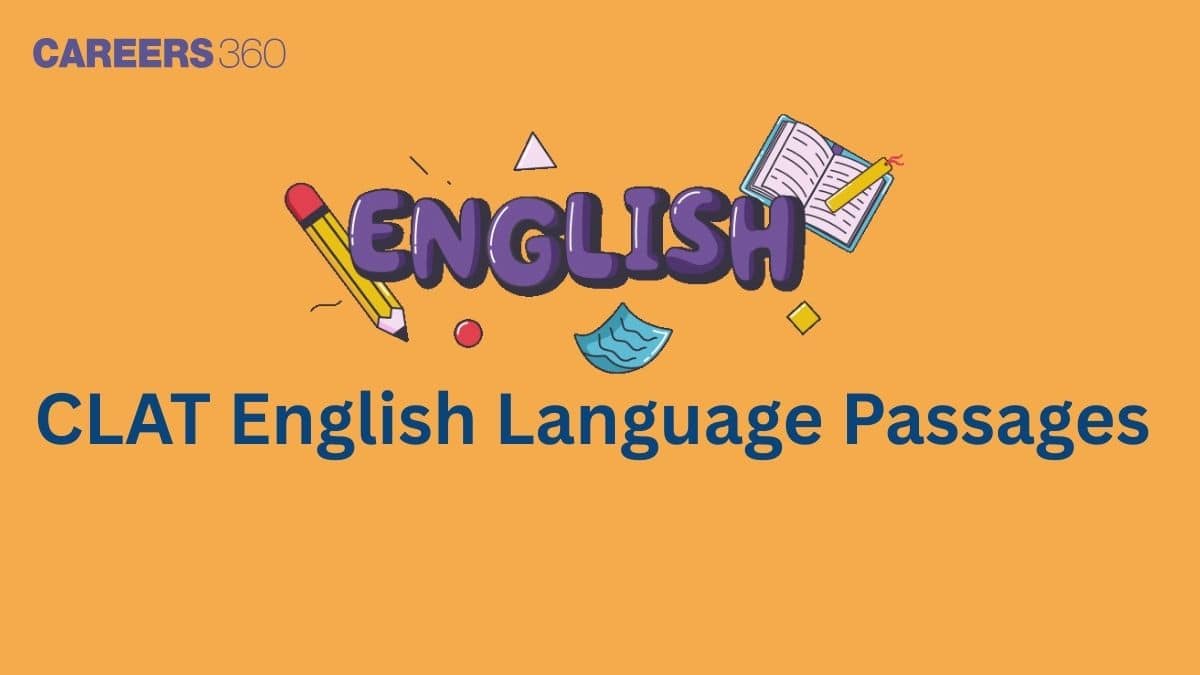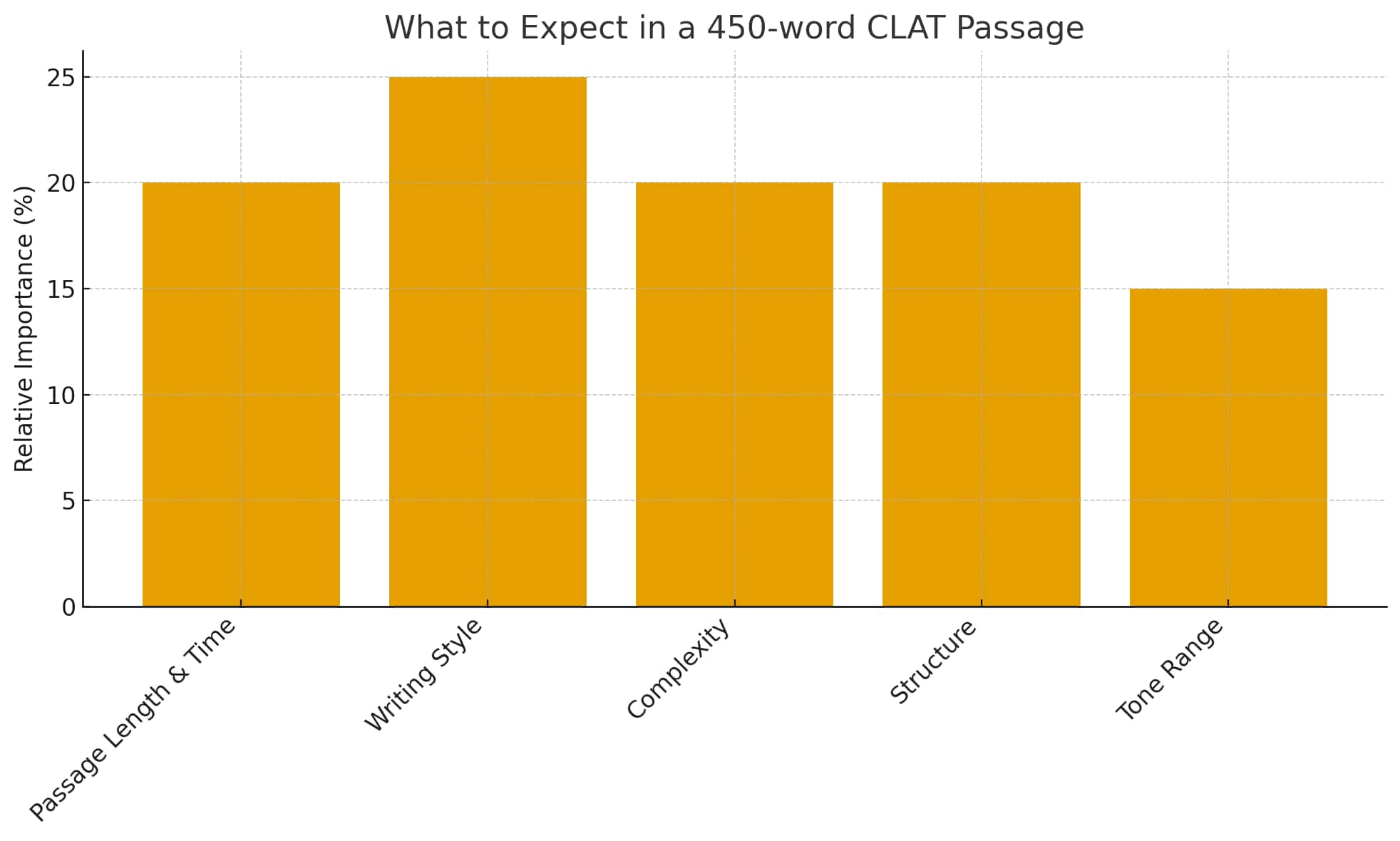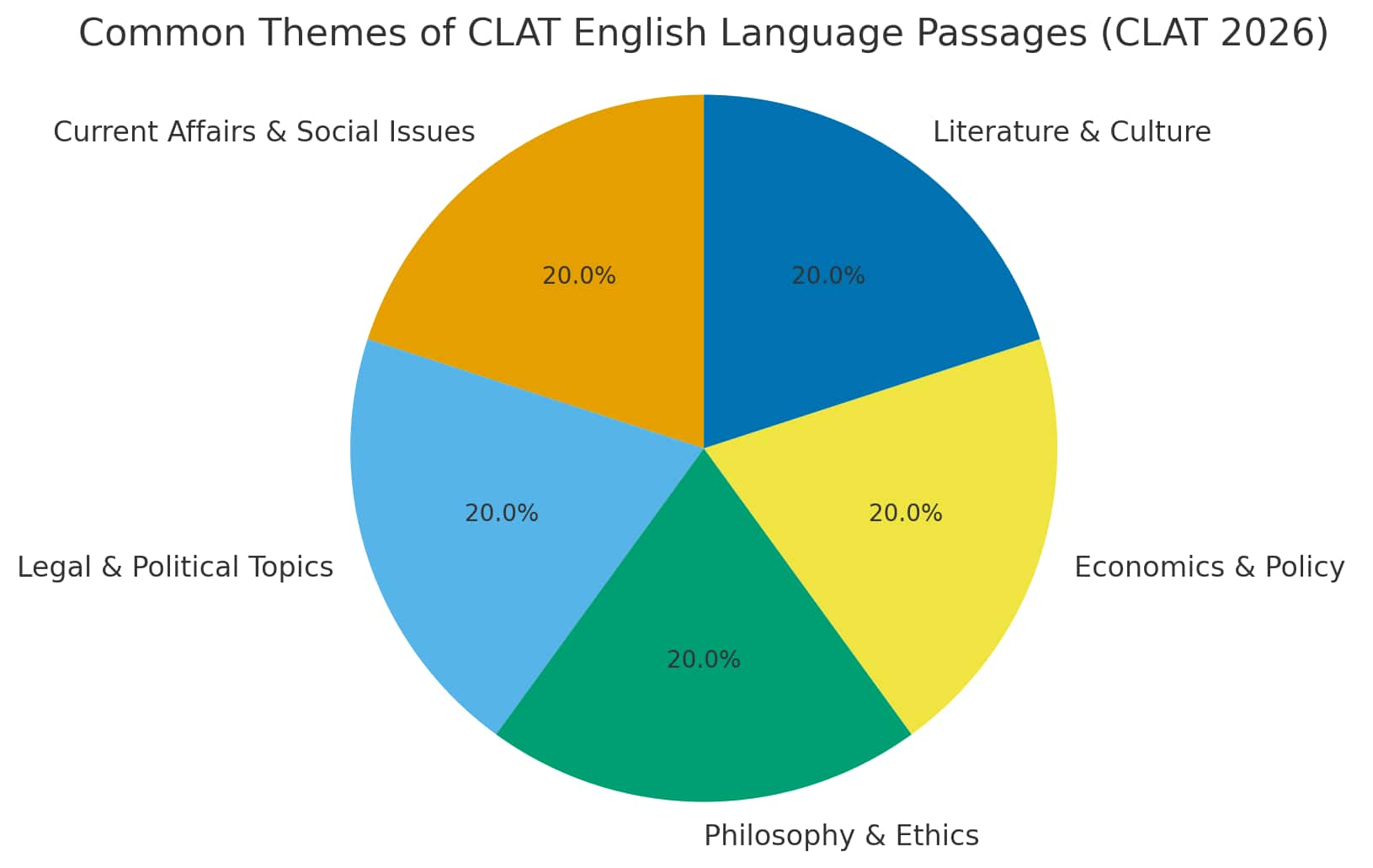Jindal Global Law School Admissions 2026
Ranked #1 Law School in India & South Asia by QS- World University Rankings | Merit cum means scholarships | Early Admissions (Pahse 2) Deadline: 28th Feb’26
Preparing for the CLAT 2027 English Language section can feel overwhelming, especially when you are faced with long passages of around 450 words each. The CLAT 2027 English Language Passages are designed to test not just your reading ability, but also your critical thinking, vocabulary, and comprehension speed. Many aspirants struggle with CLAT 2027 Time Management in this section, but the right strategy can turn it into one of the highest-scoring areas of the CLAT 2027.
This Story also Contains

In this article, we’ll guide you through everything you need to know about CLAT 2027 English Language passages - What kind of passages appear, how to approach them, and the skills you need to develop. With insight into the question pattern, practice tips, and expert strategies, you’ll learn how to tackle lengthy passages effectively and maximise your score in the CLAT 2027 English section.
The English Language passages test both Reading Comprehension and Critical Reasoning skills.
They assess how well you can interpret Arguments and Comprehension, and Critical Reasoning skills.
These passages are not just about vocabulary; they evaluate your ability to connect ideas, analyse tone, and infer meaning.
Performance in this section often reflects your overall ability to deal with legal texts, as law school will require reading dense material.
A strong performance here can boost your total score significantly, since passages usually carry multiple questions linked to one text.
Ranked #1 Law School in India & South Asia by QS- World University Rankings | Merit cum means scholarships | Early Admissions (Pahse 2) Deadline: 28th Feb’26
Among top 100 Universities Globally in the Times Higher Education (THE) Interdisciplinary Science Rankings 2026
Here’s a detailed overview of the CLAT 2027 English Language section.
Particulars | Details |
Passages | 4-6 |
Number of Questions | 22-26 MCQs |
Marks | 22-26 |
Negative Marks | 0.25 for every wrong answer |
Important Topics |
|
You can Also Check

Each Passage is usually around 400-450 words, taking about 5-7 minutes to read and answer questions.
The style of writing is often editorial, academic, or analytical - similar to newspaper columns or opinion essays.
Expect Complex sentence structures, nuanced arguments and layered perspectives.
Passages may present a central theme, followed by supporting examples, counter-arguments, or real-world references.
The CLAT 2027 English Language can range from formal and descriptive to critical and argumentative, depending on the topic.
Here are the Common Themes of CLAT English Language Passages in CLAT 2027.

Themes | Key Topics |
Current Affairs & Social Issues | Education Reforms, Gender Equality, Environment, Technology, Etc. |
Legal & Political Topics | Constitutional Rights, Governance, Democracy, Legal Reforms. |
Philosophy & Ethics | Morality, Justice, Human Behaviour, Freedom of Speech. |
Economics & Policy | Inequality, Globalisation, Consumerism, Financial Inclusion. |
Literature & Culture | Excerpts Discussing Art, Literature, And Cultural Shifts. |
Below are the tips to improve vocabulary for the CLAT 2027 Exam
Read Newspapers and Editorials Every Day: Reading The Hindu or Indian Express daily, particularly the editorial section, can help you better understand new words and put them in perspective.
Keep a Personal Vocabulary Journal: To help you remember new terms, write down their definitions, synonyms, antonyms, and sentence usage.
Practice Using Word Lists and Flashcards: To swiftly review words, use Quizlet or physical flashcards. Pay attention to CLAT-specific word lists, particularly those related to law and current events.
Learn Through Context and Usage: Read novels, essays, and summaries of court cases to gain an understanding of how words are used in phrases rather than memorising them by heart.
Complete the CLAT-Specific Vocabulary Tasks: Exam-oriented vocabulary can be strengthened by practising passage-based questions, synonyms, antonyms, and fill-in-the-blanks from prior years and practice exams.
Play Word Games and Quizzes: Online vocabulary tests, Scrabble, and crossword puzzles enhance learning and aid in long-term memory.
Review Frequently and Use in Writing: To help you remember new words, go over your list of words again and try incorporating them into essays, notes, or conversations.
Last Date to Apply: 25th Feb | Ranked #18 amongst Institutions in India by NIRF | Ranked #1 in India for Academic Reputation by QS Rankings | 16 LPA Highest CTC
India's Largest University | BCI approved | Meritorious Scholarships up to 5 lacs |
Below are the tips to improve vocabulary for the CLAT Exam
Read Newspapers and Editorials Every Day: Reading The Hindu or Indian Express daily, particularly the editorial section, can help you better understand new words and put them in perspective.
Keep a Personal Vocabulary Journal: To help you remember new terms, write down their definitions, synonyms, antonyms, and sentence usage.
Practice Using Word Lists and Flashcards: To swiftly review words, use Quizlet or physical flashcards. Pay attention to CLAT-specific word lists, particularly those related to law and current events.
Learn Through Context and Usage: Read novels, essays, and summaries of court cases to gain an understanding of how words are used in phrases rather than memorising them by heart.
Complete the CLAT-Specific Vocabulary Tasks: Exam-oriented vocabulary can be strengthened by practising passage-based questions, synonyms, antonyms, and fill-in-the-blanks from prior years and practice exams.
Play Word Games and Quizzes: Online vocabulary tests, Scrabble, and crossword puzzles enhance learning and aid in long-term memory.
Review Frequently and Use in Writing: To help you remember new words, go over your list of words again and try incorporating them into essays, notes, or conversations.
"The team was elated when they received the news of their victory. They had worked hard for months, overcoming obstacles and challenges. It was an emotional moment for everyone, especially considering the numerous setbacks they had faced during their preparation."
1. What does the word "elated" most nearly mean in the context of the passage?
A) Angry
B) Sad
C) Excited
D) Surprised
Correct Answer: C) Excited
Explanation: "Elated" means feeling great joy or excitement, especially due to a positive event or outcome, which fits the context of victory after hard work.
2. Which of the following words is most similar to "obstacles"?
A) Opportunities
B) Challenges
C) Achievements
D) Results
Correct Answer: B) Challenges
Explanation: "Obstacles" refers to things that hinder progress, and "challenges" are situations that require effort or determination, making them synonymous.
3. What does the word "setbacks" mean in the context of the passage?
A) Progresses
B) Delays or difficulties
C) Plans
D) Achievements
Correct Answer: B) Delays or difficulties
Explanation: "Setbacks" refers to hindrances or difficulties that delay progress, aligning with the challenges the team faced during preparation.
4. Which word is the opposite of "emotional" in the passage's context?
A) Passionate
B) Indifferent
C) Sensitive
D) Empathetic
Correct Answer: B) Indifferent
Explanation: "Emotional" suggests a strong feeling, while "indifferent" means lack of emotion or concern, making it the opposite in this context.
5. Which of the following best describes the mood of the passage?
A) Pessimistic
B) Joyful
C) Neutral
D) Sad
Correct Answer: B) Joyful
Explanation: The passage conveys a positive and celebratory mood as the team is elated after overcoming their challenges and winning.
"Despite his reticence in meetings, John was always the first to offer help when his colleagues needed it. His quiet demeanour masked a strong sense of responsibility, and he believed in quietly contributing to the success of the team."
6. What does the word "reticence" most likely mean in the context of the passage?
A) Talkativeness
B) Silence or reluctance to speak
C) Confidence
D) Assertiveness
Correct Answer: B) Silence or reluctance to speak
Explanation: "Reticence" refers to a reluctance or hesitation to speak, which fits the description of John being quiet during meetings.
7. Which of the following words is most similar to "demeanor"?
A) Behaviour
B) Appearance
C) Attire
D) Performance
Correct Answer: A) Behaviour
Explanation: "Demeanour" refers to the outward behaviour or conduct of a person, making "behaviour" the most similar word.
8. What is the meaning of "masked" in the passage?
A) Hidden or concealed
B) Revealed
C) Celebrated
D) Expressed
Correct Answer: A) Hidden or concealed
Explanation: "Masked" in this context means hidden or concealed, as John’s quiet demeanour hides his strong sense of responsibility.
9. Which of the following words is the opposite of "contributing"?
A) Assisting
B) Withdrawing
C) Helping
D) Supporting
Correct Answer: B) Withdrawing
Explanation: "Contributing" means giving or adding to something, while "withdrawing" refers to taking away or not participating, making it the opposite.
10. What does the word "responsibility" imply in the passage?
A) Avoiding tasks
B) Avoiding commitments
C) The duty to take action
D) The ability to lead
Correct Answer: C) The duty to take action
Explanation: "Responsibility" refers to the obligation or duty to take action, in this case, to contribute to the team’s success.
The recent surge in technology has led to an overwhelming reliance on digital tools. While these advancements provide convenience, they also pose significant challenges, including the potential loss of personal privacy. Experts warn that this dependency may render individuals vulnerable to various forms of surveillance. As technology continues to evolve, it is imperative to maintain a balance between the benefits of digital tools and the protection of individual rights.
Questions:
11. What does the word "surge" most closely mean in the context of the passage?
a) A drop in demand
b) A sudden increase
c) A steady decline
d) A gradual improvement
Correct answer: b) A sudden increase
Explanation: "Surge" refers to a sudden or strong increase, often in a specific direction, like an influx or rise.
12. What is the tone of the word "overwhelming" as used in the passage?
a) Positive
b) Neutral
c) Negative
d) Uncertain
Correct answer: c) Negative
Explanation: "Overwhelming" suggests something too much to handle, indicating a negative effect or challenge.
13. In the passage, the phrase "potential loss of personal privacy" implies:
a) Complete eradication of privacy
b) Possible decrease in privacy
c) Complete safety from privacy threats
d) Irrelevant issues to privacy
Correct answer: b) Possible decrease in privacy
Explanation: "Potential loss" indicates that there is a possibility, not certainty, of privacy being compromised.
14. Which of the following is a synonym for "vulnerable" as used in the passage?
a) Immune
b) Exposed
c) Insensitive
d) Fortified
Correct answer: b) Exposed
Explanation: "Vulnerable" means open to harm or danger, which is similar to "exposed."
15. The phrase "maintain a balance" refers to:
a) Discarding one aspect in favour of the other
b) Keeping equal importance for both aspects
c) Prioritising only one aspect
d) Ignoring both aspects
Correct answer: b) Keeping equal importance for both aspects
Explanation: "Maintain a balance" means giving due consideration to both aspects, without favouring one over the other.
The novel Frankenstein by Mary Shelley explores the consequences of unchecked ambition and the quest for knowledge. The protagonist, Victor Frankenstein, seeks to transcend the limitations of human existence by creating life. Still, in doing so, he awakens a series of tragic events that ultimately lead to his downfall. The creature, rejected by society for his monstrous appearance, embodies the consequences of playing God. Shelley's narrative weaves together themes of isolation, guilt, and the ethical implications of scientific exploration.
Questions:
16. What is the meaning of the word "transcend" as used in the passage?
A) To limit
B) To surpass
C) To repeat
D) To diminish
Answer: B) To surpass
Explanation: "Transcend" means to go beyond or surpass, which aligns with Victor Frankenstein’s goal to exceed human limitations.
17. In the context of the passage, what does the word "embodies" mean?
A) Represents
B) Rejects
C) Creates
D) Denies
Answer: A) Represents
Explanation: "Embodies" refers to something that represents or expresses a concept; in this case, the creature represents the consequences of Frankenstein's actions.
18. Which of the following is the best synonym for "guilt" in the passage?
A) Happiness
B) Remorse
C) Pride
D) Indifference
Answer: B) Remorse
Explanation: "Guilt" refers to the feeling of remorse, especially after doing something wrong. In the passage, Victor Frankenstein feels guilty for his actions.
19. What is the tone of the word "monstrous" as used in the passage?
A) Admirable
B) Terrifying
C) Innocent
D) Optimistic
Answer: B) Terrifying
Explanation: "Monstrous" in this context refers to something that is terrifying or frightful, which is how the creature is perceived due to his appearance.
20. What is the most likely meaning of "unveils" in the phrase "unveils the consequences"?
A) Conceals
B) Exposes
C) Limits
D) Amplifies
Answer: B) Exposes
Explanation: "Unveils" means to reveal or expose, indicating that the passage is talking about the revelation of the tragic consequences of Frankenstein’s actions.
You may also check:
Frequently Asked Questions (FAQs)
CLAT passages are usually around 400–450 words long.
Typically, 4–6 passages are asked, each followed by 5–6 questions.
The CLAT 2026 English Language section carries 22–26 marks.
No, grammar is indirectly tested through comprehension and inference in English passages in CLAT 2026.
Comprehension, inference, vocabulary, and critical reasoning skills are tested in CLAT English passages.
On Question asked by student community
Since you have not specified your category, I will answer for all categories. A CLAT rank of 38169 (typically 40-45 marks) makes admission to top NLUs difficult. For General candidates, chances are nil. Even for OBC, SC, and ST categories, admission is primarily possible only through state domicile quotas or
After the CLAT results are declared, candidates participate in a centralised online counselling process managed by the Consortium of NLUs. Eligible candidates register on the official portal, submit their NLU preference list , and pay a counselling fee. Seat allotment happens across multiple rounds based on rank, category, and preferences,
Hi, you can apply for admissions in Nirma University, NFSU Ahemdabad, Alliance, IPU University and affiliated instiutes (in case you are reserved category candidates), UPES Dehradun, BITS Law School etc.
Start preparing for CLAT by first understanding the exam pattern and syllabus, which includes English, Current Affairs, Legal Reasoning, Logical Reasoning, and Quantitative Techniques. Make a simple daily routine and begin with basics read newspapers regularly for current affairs, practice comprehension passages for English and legal sections, and solve basic
Hello,
With a CLAT AIR of 33599 and SC category rank of 2103, and being a Delhi domicile, your chances at IP University (GGSIPU) are moderate to good, especially in later counselling rounds.
Based on previous year trends, some IPU-affiliated law colleges have closed at higher SC category ranks, so
Among top 100 Universities Globally in the Times Higher Education (THE) Interdisciplinary Science Rankings 2026
NAAC A+ Accredited | Among top 2% Universities Globally (QS World University Rankings 2026)
Excellent curriculum; an impressive range of electives, besides core law courses. Up to 100% merit scholarship on a first-come, first-served basis
Moot Court | Mock trials | Legal Aid Clinic
Admissions open for B.A. LL.B. (Hons.), B.B.A. LL.B. (Hons.) and LL.B Program (3 Years) | School of Law, MRU ranked No. 1 in Law Schools of Excellence in India by GHRDC (2023)
NAAC A++ Accredited | Ranked #11 by NIRF